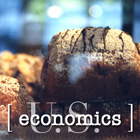
| SUPPLY & DEMAND STRUGGLE FOR POLITICAL PRE-EMINENCE 9 May 2003 Current debate regarding tax policy and its capacity to stimulate growth has revolved primarily around the president's tax plan. Though proponents of the plan have artfully avoided the term "supply-side economics", the plan is considered by many to be one of the most directly supply-side proposals in memory, giving most of the breaks to those who control the reins —and the purse-strings— of the nation's industrial production —supply— capacity. The issue currently is that recent history has shown that tax cuts intended to create supply have failed to solve present economic difficulties. A variety of economists have asserted that current economic troubles stem from a glut of supply. This would indicate a need to stimulate demand, it being considered counterproductive to create a further surplus of supply while consumers have less to spend. What's more, if producing an excess of supply neither brings new jobs —needed to produce the consumer capital to make demand to purchase that supply— nor directs producers' investments toward more accessible pricing of that supply, then lifting up the supply-side won't bring the whole economy to the right equation of buoyancy —needed, again, to keep consumer demand at pace with increased supply. The most outspoken opponents of the current tax proposals being heard in Congress have cited the perils inherent in excluding non-supply-side theory from the debate altogether. It is feared that the nation is being boxed into a questionable economic position, at precisely the time when it is most vulnerable to flawed policy actions. For instance, recent years have seen economic troubles spawned by massive corporate accounting frauds, on a scale not previously seen. Those abuses, while not ubiquitous, not even characteristic of a narrow majority of enterprises, brought about the sudden evaporation of billions of dollars of invested wealth. That speaks volumes about the need for some sort of safety net to protect those who have little or no control over their investments or where interest earned will come from —i.e. small investors, workers with IRAs, or 401k plans, which handle all portfolio management without directly consulting the individual investor. It is not that private sector investment is inherently dangerous, or that private interests cannot contribute a great amount of new wealth to a dynamic economy; the problem lies in giving unfettered authority to such interests to act without adequate scrutiny or a safety net of some kind to ensure their mistakes do not rob innocent third parties of hard-earned retirement funding and/or healthcare reserves. It can be argued quite effectively that in the current climate —and make no mistake, this is why most Republican voters support tax cuts— a move to stimulate demand would be the better medicine. It would stimulate all aspects of market performance, starting at the root level, creating stronger competition, empowering small entrepreneurs and/or innovators, and forcing production to grow by employment, not by fiat. But that argument isn't carrying much water in the halls of Congress, because the people who would directly benefit from such a strategy are not walking the halls of Congress. They may phone their representatives, or write letters, or sign petitions, but they are not often heeded unless numbering in the millions, while those who will benefit directly from the currently planned strategy do have the ear of Congress, and often only a few of their intermediaries suffice to get business done. |
|||||||
|
||||||||

